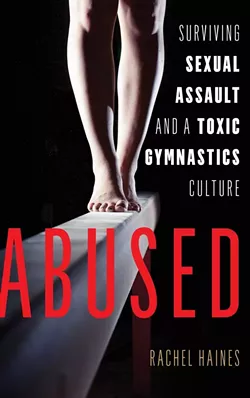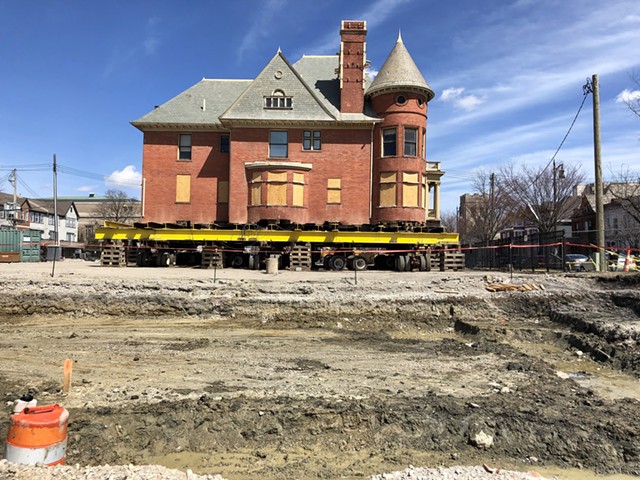The following is an abridged excerpt from Abused: Surviving Sexual Assault and a Toxic Gymnastics Culture, out April 12 on Rowman & Littlefield. Reader discretion is advised. My story contains vulnerable, personal, and explicit descriptions of my experiences as a gymnast. This includes multiple depictions of my interactions with U.S. gymnastics team doctor and convicted serial child molester Larry Nassar and U.S. Olympic gymnastics coach John Geddert.
A plea: Please do not assume my experiences were the same as anyone else's accounts. Though there are hundreds of other survivors, my story is only mine, and I did not write this book to explain the accounts of others. As a survivor, I wholeheartedly believe everyone has a voice that deserves to be heard. Everyone's experiences matter equally and should be equally trusted and believed.
This story is mine, and mine alone. I am Survivor 195.
Unexpectedly in eighth grade, I went through my first emotional distress with gymnastics.
It was a normal day; all of my teammates and I stood huddled near our lockers before practice started. We were training for our second Nationals, so practices were fun and lighthearted. But then our coach came to us with none of her usual peppy enthusiasm and said she had news.
She explained that our gym had been sold and purchased by a new owner who wanted to clear out the coaching staff and start over. In other words, our coach was leaving. I know this had a traumatic effect on me because of how vividly I remember that day. Our team was in chaos. Moms snatched their daughters moments after the news broke and stated, "We're going to try out other gyms right now and see what is a good fit. We will keep you posted on what we find."
In their defense, quick action was needed. This change had occurred two weeks before Nationals. We needed gyms to train at, and we needed our coach — who had gotten us this far — to continue coaching us. There was a clear panic that overtook our gym, and I felt a buzz of emotions that I couldn't handle. I believe at this moment, I had my very first anxiety attack.
I had no idea where I was going to go.
Did I want to go to a different gym?
My coach connected with numerous gyms in the hopes of finding one that would let her team train there until Nationals. She called many gyms that morning with the goal of finding one that could keep us all together in one place. Only one coach responded with genuine empathy and welcomed us along with our coach into his gym: Gedderts' Twistars.
Everyone knew this gym. It had the most accomplished and competitive reputation in the nation. It housed Elite Program competitors, National Champions, and hopeful Olympians. Gymnasts feared the blue leotards that were worn by Twistars gymnasts. Seeing them walk into competitions meant accepting second place. John Geddert had established himself as a successful coach and built up his reputation to make himself a respected figure in the gymnastics world. Everyone knew him. He walked with such power and leadership that it was terrifying to look at. There was no denying that he was the most intimidating figure in the gymnastics world.
Here he was, inviting us into his gym, giving us full access to prepare for Nationals. He hired our coach so she would be able to coach us through the remainder of the season and still earn a living. He made me question my previously drawn negative conclusions about his personality. He was selflessly giving us his gym, knowing he would not get any credit for it at Nationals.
I remember my first practice at Twistars vividly. My team and I huddled together in a close circle before practice began as the Twistars girls huddled in their own cluster on the other side of the floor. We followed them through warm-ups, let them lead us through stretches, and followed the structure they did for practices. I was put on bars first. I wanted to do everything to stay out of the way of the Twistars team. After all, I was invading their gym. It seemed like every girl was training for Nationals there, and nobody was taking it lightly.
I guess that is the difference between a gym that makes qualifiers and a gym that breeds champions.
Switching gyms and equipment in gymnastics is a lot harder than you can imagine. For example, each beam is dramatically different. You get some that have sharp edges, some that are slippery, and some that feel two inches wide instead of four. Bars are all different, too. Some are wobbly, some are bouncy, and some are so tight they don't move the way we need them to in order to successfully perform our skills. Every gym that I have ever been to has a "good" set of bars that every girl prefers to use. Conversely, every gym has a "bad" set of bars everyone avoids. Being a brand-new member of the gym, I had no idea which set was which at Twistars.
But I learned quickly.
Nobody was using the red Spieth bars, and there were lines for the other sets. I wanted to impress John with my effort and willingness to take hundreds of turns since I was not going to impress him with my gymnastics. I volunteered myself to use the untouched Spieth bars.
Dumb.
These bars were the bounciest set I had ever used. They wobbled and shifted at every movement, and catching a release — let alone hitting a handstand — was near impossible for someone who had never used them before. I looked like a mess, and I felt even worse. I took thirty turns, all unsuccessful at completing even half of a routine. After falling for what felt like the thousandth time, I saw John watching.
I could feel my chest get flaming hot, my head spin, and my throat close up. I was not meeting my full potential and I was failing: my two biggest fears. I was failing in front of the person I wanted to impress the most. I hit my emotional breaking point and started to cry.
I remember thinking, "Great. Now he thinks I suck and I'm a baby."
I will never forget what John did next. He came over to me, softened his usual stern and cold voice, and said, "You don't like these bars much do you?" I shook my head no, trying to make eye contact to show him respect, but my eyes were too watery to see his face clearly. He then said, "My girls hate these bars. I was very impressed you chose them. I have my Elites use them, as these are the bars that they use for international competitions."
John Geddert was showing me he understood my frustration?
He looked at me, pointed to the bars that had lines of gymnasts waiting to use them, and said, "I think you will like these two sets of bars better. I know it has been a difficult transition, but my gym is open to you. Don't let a set of Spieth bars be an unnecessary stress before Nationals."
I was comforted by John. To this day, I truly cannot understand why he had a soft spot for me. I was just an untalented crybaby for all he knew at this point. I think he could see my potential. Perhaps he knew my desire to outwork his team on my first day was out of respect for him.
I wanted to deserve to be there.
Nationals came even quicker than I had imagined. I traveled with the Twistars team, but stayed with my coach. I was so relieved it was finally time to compete after the stressful and chaotic few weeks leading up to it. Again, I watched the girls who were warming up. I felt more confident this year about my abilities. I felt like I belonged at the competition, but I was nervous about impressing my new coaches. I felt like I was trying out again, with the added stress of it being the most competitive event of my season and for one of the most successful gyms in the nation.
My first event went solid. I stopped watching the competition and only cared about doing my personal best to impress my new coaches at Twistars. By the last rotation, I had no idea where I was in the rankings, but both my coaches had a different attitude about my last event.
I figured they were just excited about the competition almost being done.
It wasn't until I was almost up when the Twistars coach approached me and said, "Rachel, you can win." Goosebumps shot through my body in disbelief.
Me? A National Champion? Could two weeks at Twistars really do that to my gymnastics?
Of course my last event was bars, the event that made my first practice at the new gym so horrendous. Again, God was giving me an opportunity for redemption. He was letting me show my full potential. For some reason, I wasn't nervous. I faced the judge to salute and begin my routine and saw the gymnast who was in second place standing behind the judges table... watching. She was watching to see if I would fail, and she would become a National Champion instead. She was waiting for me to hand her the trophy because of an error.
She will never understand how much that motivated me.
The routine felt like it was in slow motion. For every movement I was concentrating hard, saying my cue words, and preparing for the skill that would follow.
"Handstand. Slow. Tight. Breathe. Squeeze. Release." I remember how slow my dismount felt. My ears drowned out all of the noise, and I felt my feet hit the ground.
Stuck.
At my second Nationals, I became a National Champion.
***
I was surprised at how much I meshed with these girls I had once seen as gymnastics robots. My respect for John continued to grow as I trained for him. I could tell he cared about me because of how much I respected him. I was one of the few gymnasts that he never yelled at. I truly think he coached every person individually. Some of his gymnasts needed a greater shove to be motivated, and others were more goal-oriented on their own. Those who disrespected him by rolling their eyes, cheating on assignments, and skipping practice were treated with equal disrespect from him. Relationships were two-way streets to John.
My first summer at Twistars was harder than anything I had ever done before. For one, Twistars was an hour and a half away from my home, so 8 a.m. practices meant getting up at 5:45 every morning. We trained just the same as we did in season, never stopping to rest and always looking for ways to perfect the smallest deductions. I learned quickly why they were the cleanest, most consistent, and most competitive team in the nation.
Summers at Twistars also meant running. Oh, how I hated the running. John would gather the entire morning practice team and have us move outside. We did a sprinting sequence: sprint for thirty seconds, rest for ten seconds. This mirrored the endurance requirements for a floor routine.
I remember thinking, "No wonder Twistars gymnasts can make it through such difficult routines; they're trained for a marathon-length floor routine." We ran every day. On days where John could tell we were tired and hurting, he would let us stretch instead. There were always girls who would try to make up reasons to not run. John hated excuses. Even if I was sore I never told John I couldn't run. I always gave it my all. He saw me put everything I had left into the part of the training I hated the most.
One of the days after running I could feel my hamstring getting abnormally tight. It was painful, and I felt the need to grab on to hold it together or it would come flying off. It hurt every time I had to step forward, and splits were excruciating.
I let it hurt for weeks before I decided I needed to tell a coach. I hated being injured, and I held off from telling John as long as I could bear it to avoid having to miss practices to recover. I finally told him that I was in pain, where it hurt, and what it hurt to do. I remember telling him because it was the first time I had told John that I was in pain, and I was scared to disappoint him. I remember the way he looked at me when I was telling him and being surprised when he looked genuinely concerned.
Then I made the mistake of telling him that it had been hurting for quite some time, and he turned angry.
"Rachel. Why didn't you tell me right when it started hurting? Now it might be ten times more serious because you kept using it. Go stretch and ice."
Honestly, I think this was the very first time John was upset with me. I was truly working through it because I didn't want to disappoint him, but it backfired. I was never someone who faked pain to get out of doing assignments, and it made him believe me when I told him something hurt. He immediately sent me to see our team doctor.
He sent me to see Larry Nassar.
This was the first time of many times I would see Larry for my injuries. Before this, I had only heard of the magical doctor who healed the worst injuries. People said he had the kindest heart and was a saint in a gym full of powerful and intimidating figures. He listened to your problems and always took your side, even if it was against John. People described him as unimaginably selfless. He sacrificed his time every Monday night to come see Twistars gymnasts for free. He opened up his home, his office, and his training room to all of us at any point. From the outside, he seemed an angel.
Larry sent me for an MRI that showed I had a torn hamstring. It was not bad enough to require surgery, but it would be an extensive amount of time off and numerous meetings for physical therapy.
I was 14 years old when Larry told me he was doing an ‘internal manipulation’ on me.
tweet this
Naturally, he volunteered to be my physical therapist.
Larry and I worked together for months strengthening my hamstring. My mom came often with me, but sometimes she was absent when I saw him at the gym. Larry came when practice was over on Mondays. Coaches and girls who didn't have injuries went home, and we stayed to get our so-called treatment.
"Treatment."
I would most regularly see Larry at the gym on Mondays. His training room at Twistars was small, doubling as a storage room for our recreational equipment. It smelled musty and sweaty as we always saw him after a five-hour practice, so none of us were necessarily clean. People crammed into that tiny room even if he was "treating" someone so they could talk to him. There was absolutely no privacy. Both girls and boys saw Larry, and there was no curtain, no door, no separation from everyone seeing him perform his treatments... and he still did them.
Power of authority.
I was 14 years old at this point. I was 14 years old when Larry told me he was doing an "internal manipulation" on me. He told me pain in a tight hamstring can sometimes be lessened if the muscles around it are relaxed. He said this would require "internal massaging." He wasn't asking for permission to perform his treatment, he was more giving me a warning of what was coming. I still never said no. I didn't tell him to stop when I felt like I wanted to puke from discomfort. At 14 years old, part of me knew something wasn't right, but I never told him I wasn't going to let him do it anymore.
I dreaded the days I had to see Larry because of the way he made my body feel. I worried about what he was thinking about. I was curious if he was judging my body. I told myself the typical statement we all tell ourselves when we have uncomfortable and vulnerable appointments with medical professionals: "He sees hundreds of girls; he won't remember my body." I told myself his power, credentials, prestige, and authority gave him the right to treat my body how he saw best for my injury. His power and authority trumped my comfort and ethics — a disgusting flaw in the culture of gymnastics. I know Larry remembers my body.
He continued to perform manipulations on me until my hamstring felt normal again a few months later.
***







